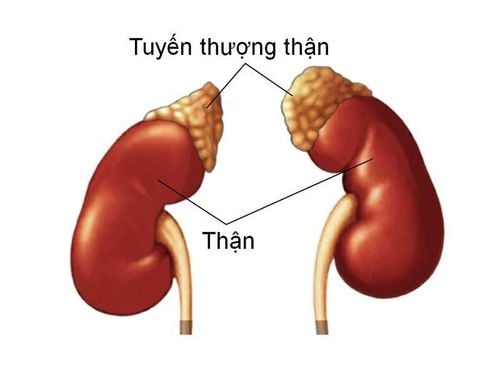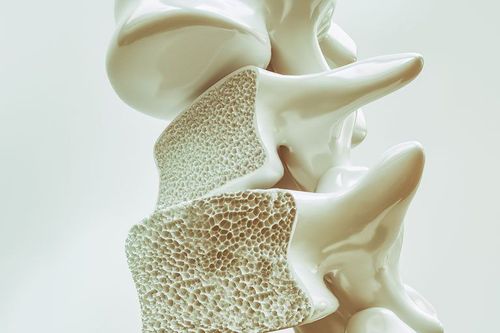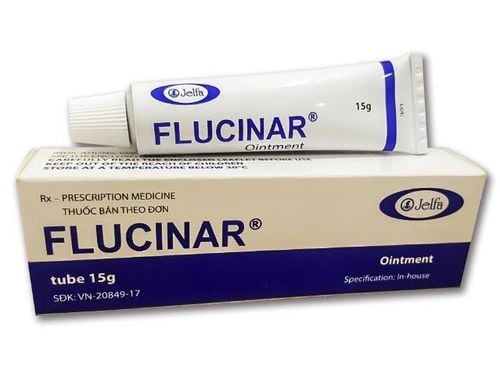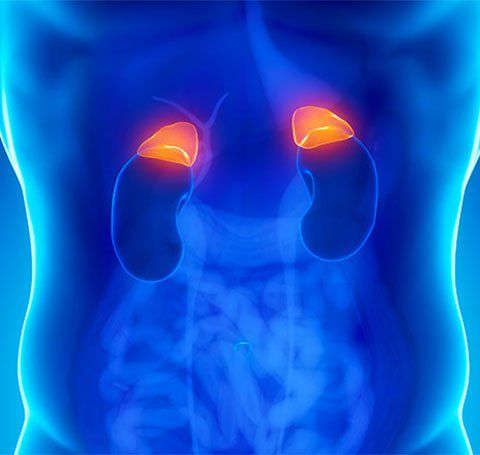This is an automatically translated article.
With widespread and uncontrolled availability, products containing corticosteroids are easily purchased and used by patients. In the long run, the patient will have adrenal insufficiency due to corticosteroid use. This is a complication that makes them unable to stop the drug or sometimes experience acute adrenal insufficiency, which causes cardiovascular collapse and is life-threatening.
1. What is adrenal insufficiency caused by corticosteroids?
Adrenal gland is conical, located on two kidneys, in the bundle layer secretes glucocorticoids. These are hormones that play an important role in the energy metabolism of cells in the body. In addition, glucocorticoids also partially assist in stabilizing hemodynamics, keeping homeostasis through control of secretion or reabsorption of salt and water. At the same time, this hormone also helps the body increase resistance to internal and external stress. The functioning of the adrenal glands is controlled by ACTH, a hormone secreted by the hypothalamus-pituitary gland.
Because of these very significant roles in physiological activities, glucocorticoids have been studied for a long time to artificially synthesize, called corticoids. Today, corticosteroids have been mass-produced industrially with low cost and easy access. Patients will feel very healthy in a "miracle" way right after using corticosteroids, all diseases seem to recede. However, after a long time using the drug, the body will be at risk of adrenal insufficiency due to corticosteroid use.
Adrenal insufficiency due to excessive glucocorticoid treatment is the most common cause of secondary adrenal insufficiency. This condition, also known as pseudo-Cushing's syndrome, is distinguished from true Cushing's by an abnormally overactive adrenal gland.
At this time, the function of the adrenal gland is no longer guaranteed as before because the concentration of glucocorticoids of foreign origin is always kept at an excessively high concentration in the blood, inhibiting the hypothalamic area. saddle reduces ACTH secretion. In the early stages, basal ACTH and basal cortisol levels may be normal, but ACTH stores are depleted. Then, prolonged deficiency of ACTH causes the adrenal cortex to atrophy, leading to decreased secretion of cortisol. When the body is under stress, the ability to respond to cortisol secretion will not be sufficient. Finally, all physiological activities of the body will be stagnant and completely dependent on external sources of corticosteroids.
The origin of products containing exogenous glucocorticoids are new drugs such as hydrocortisol, prednisone, prednisolone, dexamethasone, betamethasone... These drugs can be in the form of oral, inhaled, joint injection, intramuscular injection used too level. Even more frightening is that the sources of glucocorticoids mixed in traditional medicines, traditional medicines, health supplements of unknown origin, widely circulated in the community, are bought and taken by people very easily. .
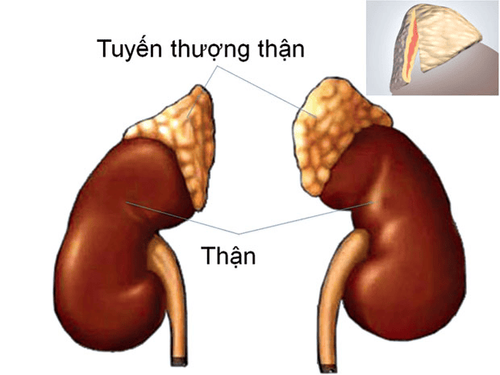
Tuyến thượng thận có hình mũ, nằm trên hai quả thận
2. Signs of adrenal insufficiency due to corticosteroid use
Similar to true Cushing's syndrome caused by excessive glucocorticoid secretion by the adrenal glands, if high doses of corticosteroids are used for a long time, the patient also has typical symptoms such as hirsutism, weight gain, round face, middle obesity. heart, fat accumulation in the neck, back of the neck, red round face, thin skin, stretch marks, weakness in the proximal limbs, difficulty walking. When the skin is damaged, the wound will be difficult to heal; The doctor also discovered high blood pressure that is difficult to control or impaired glucose tolerance. Some cases also suffered from mental disorders, agitation, uncontrolled behavior, especially when using corticosteroids in young children or the elderly.
If it is necessary to stop taking the drug suddenly or just reduce the dose, the patient will have symptoms of withdrawal syndrome such as irritability, fatigue, continuous lethargy, lack of vitality, loss of appetite, musculoskeletal pain. ... Even, in some patients who have used very high doses and for a long time, when corticoid is stopped, hemodynamic status will also be affected, pulse and circulatory collapse, potentially life-threatening.
3. How to diagnose adrenal insufficiency due to corticosteroid use?
Adrenal insufficiency due to the use of corticosteroids is mostly easy to recognize clinically thanks to the typical symptoms mentioned above and a history of using pain relievers, traditional drugs... for a long time and not being able to quit smoking. Besides, it is necessary to screen for some diseases that also need to be treated with chronic corticosteroids such as autoimmune system disorders, degenerative joint diseases, uncontrolled asthma, eczema...
Supportive tests diagnostic aid remains unclear. Central to this is a test that measures blood levels of cortisol. The highest physiological concentration of this hormone during the day is at 8 am, when the body is most active and lower at night. If the morning cortisol in the blood is less than 3 mcg/dl, then the diagnosis of adrenal insufficiency is certain, and vice versa, if the morning cortisol is above 20 mcg/dl, then adrenal insufficiency is ruled out.
In addition, other results will record electrolyte disturbances such as hyponatremia, hypokalemia, hyperglycemia or also hypoglycemia due to decreased cellular metabolism; Measuring osteoporosis shows a very severe decrease in bone density...
4. How to treat and prevent adrenal insufficiency caused by corticosteroids

Ngay khi bệnh ổn, bác sĩ cần thiết lập kế hoạch cai thuốc dần cho người bệnh càng sớm càng tốt, giúp khôi phục lại phần nào chức năng của tuyến thượng thận
If the blood glucocorticoid concentration is too low, the patient has severe glucocorticoid deficiency, the risk of high-grade adrenal insufficiency, the first treatment is glucocorticoid compensation. However, the treatment of glucocorticoids at this time needs to be controlled in terms of dosage and usage, avoiding side effects.
As soon as the disease is okay, the doctor needs to establish a gradual smoking cessation plan for the patient as soon as possible, helping to restore some of the adrenal gland's function. Accordingly, despite the widespread use of glucocorticoids and widespread abuse, the effectiveness of smoking cessation regimens has not been consistent across studies. However, a discontinuation plan should always achieve the dual goals of avoiding the side effects of long-term glucocorticoid use and avoiding the development of functional adrenal insufficiency.
At the same time, dose reduction should depend on the individual patient, the degree of glucocorticoid deficiency as well as the risk of exacerbation of acute diseases. Because, if the dose adjustment is not clever, the patient is impatient and uncooperative, the possibility of re-abusing corticosteroids is very high or the adrenal crisis is acute, which can lead to a severe acute illness if not detected. timely handling.
In summary, adrenal insufficiency caused by corticosteroid use is an alarming condition in the community, causing long-term deterioration in health. Prevention is always the most important role. Patients are only prescribed to use corticosteroids exactly as indicated, adhere to the dose and amount, and avoid abuse. Medicines or dietary supplements need to consult a doctor before use. Absolutely do not arbitrarily use drugs circulating on the market without clear origin and origin, both not helping to treat diseases, and possibly endangering health.
Please dial HOTLINE for more information or register for an appointment HERE. Download MyVinmec app to make appointments faster and to manage your bookings easily.
Reference source: Documents of the Medical Examination and Treatment Administration - Ministry of Health



